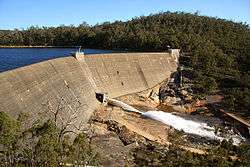Collie River
| Collie River | |
|---|---|
| Country | Australia |
| Basin | |
| Main source |
Darling Range 207 metres (679 ft)[1] |
| River mouth |
Leschenault Estuary sea level |
| Basin size | 374,500 hectares (925,410 acres)[2] |
| Physical characteristics | |
| Length | 154 kilometres (96 mi)[3] |
| Features | |
| Waterbodies | Wellington Reservoir |
The Collie River is a river in the South West region of Western Australia.
The Collie River was named by Lieutenant Governor Stirling after Dr Alexander Collie who, along with Lieutenant William Preston, in November 1829 was the first European to explore the river.[4]
The Collie River Catchment is located in the south-west of Western Australia, it covers over 3,000 km² and includes the Wellington Reservoir. For Western Australia's growing population the reservoir is considered a valuable resource, but the water is too salty for drinking. The Waters and Rivers Commission has a target of reducing the salinity of the river water to 500 mg/L by 2015 as a part of the State Salinity Strategy.[5]

Tributaries
There are many tributaries of the Collie river including Collie River East, Collie River South, Bingham river, Brunswick River, Gervase river, Hamilton river, Harris river, Ironstone Gully, Silver Wattle Gully, Worsley River, Riches Gully and Mill Brook.[6]
References
- ↑ "Bonzle Digital Atlas - Map of Collie River, WA". 2008. Retrieved 23 November 2008.
- ↑ "South West Water Resources — Regional Overview Department of Water April 2007" (PDF). 2007. Retrieved 26 July 2007.
- ↑ Western Australian Land Information Authority. "History of country town names – C". Retrieved 26 July 2007.
- ↑ Cohen, B.C. (1966). "Collie, Alexander (1793–1835)". Australian Dictionary of Biography, Volume 1. Carlton, Vic: Melbourne University Press. pp. 235–236. Retrieved 1 March 2016.
- ↑ "Waters and Rivers Commission - Salinity Situation Statement for the Collie River Catchment" (PDF). 2007. Retrieved 26 July 2007.
- ↑ "Wellington National Park, Westralia Conservation Park and Wellington Discovery Forest Management Plan" (pdf). Perth, WA: Department of Environment and Conservation, Conservation Commission of Western Australia. 2008. Retrieved 29 February 2016.
External links
Coordinates: 33°18′S 115°44′E / 33.300°S 115.733°E